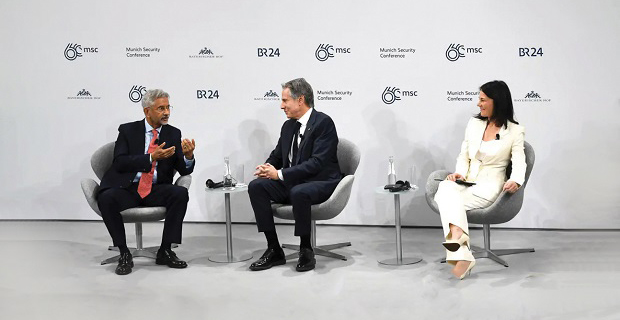MUNICH TESTS INDIA’S FOREIGN POLICY
New Delhi: In the background of India’s clear stand on the Hamas-Israel conflict denouncing the “terror” attack of Hamas on Israel on October 7 last year and endorsing the support of the US for the initial Israeli response to the same, and the country’s independent line on the much older Ukraine-Russia military confrontation which led India to even abstain from voting on the anti-Soviet resolution moved early on by the US in the UNGA, it was no surprise that at the Munich Security Conference held from February 16 to 18, External Affairs Minister (EAM) S. Jaishankar faced some searching questions on India’s foreign policy, in one of the interactive sessions.
The EAM did extremely well in detailing India’s policy approach in clear convincing terms, which is a tribute to his grip on India’s international relations as much as it is a confirmation of Prime Minister Narendra Modi’s successful stand that India’s foreign policy essentially rested on bilateral -- and even multilateral -- bonds meant to serve mutual security and economic interests without prejudicing the cause of world peace and global advancement of human development.
S. Jaishankar chose the words “smart policies” to describe India’s handling of international relations in this light and in reply to a reference to “non-alignment” made by the convener of the session, explaining that the global security environment is not “static” and that ideologically “fixed positions” could only come in the way of evolving a pathway of progress towards solution-finding for complex geopolitical and geo-economic problems of today. He indicated that being “smart” is being “positive” about serving the country’s national interests without hurting anybody else’s and embracing transparency in policy formulation.
Munich Security Conference is the world’s largest gathering of its kind debating pressing security concerns of the times under its mission of ‘Peace through Dialogue’. This time it brought together heads of state and government of a large number of countries, foreign and defence ministers, security experts, military leaders besides defence industry captains and provided a venue for important diplomatic initiatives and interactions. Its membership cuts across BRICS and G7, and includes representatives of NATO and EU countries.
S. Jaishankar, in a brilliant exposition, explained that India was not “anti-West but non-West” and affirmed that India’s relationship with the US and Europe was getting strengthened constantly. He highlighted the positive role of India in BRICS and the country’s contribution towards the expansion of G7 into G20 -- all through the process of discussions and meetings -- and succeeded in presenting India as a major independent power helping the cause of world peace and economic development. He interacted with the Chinese Foreign Minister on the sidelines and had a separate extensive discussion with US Secretary of State Anthony Blinken to review the situation in West Asia, Ukraine and the Indo-Pacific.











Comments.